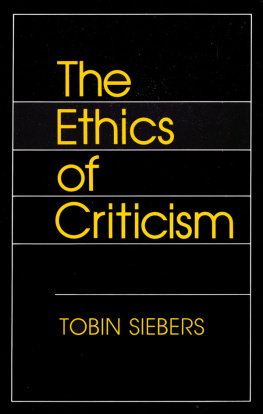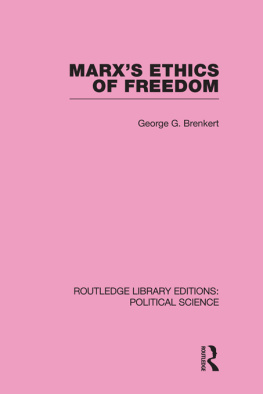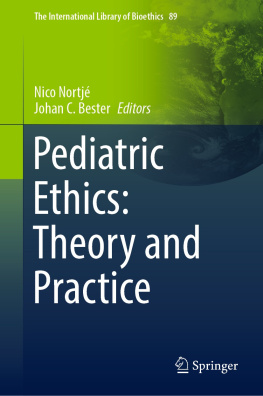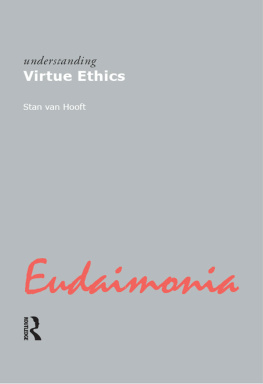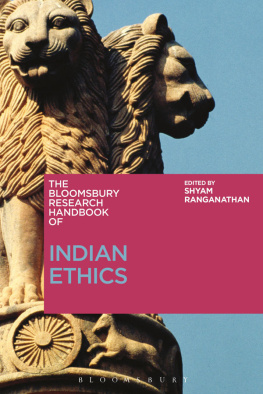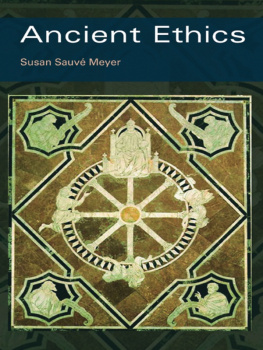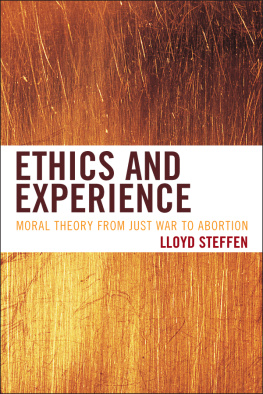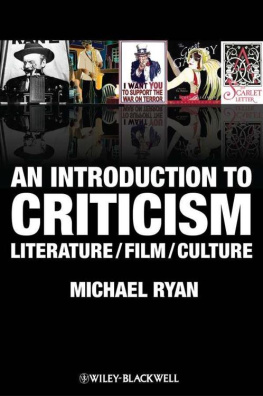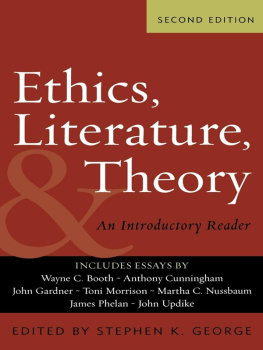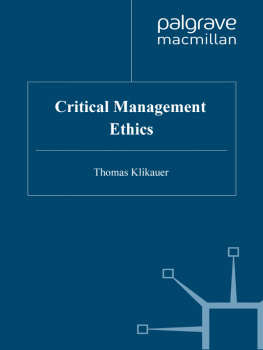
In memory of Marion Siebers 19191987
Acknowledgments
I began working on The Ethics of Criticism during my last months as a Fellow of the Michigan Society of Fellows, and it is with a special sense of completion that I find myself finishing the book at the University of Michigan after a three-year stay at Columbia University. Both institutions have played a major role in forming this book. The Michigan Society of Fellows provided early support for the project, and the Columbia Council for Research in the Humanities generously aided my efforts during the summer of 1985.
The trip from Ann Arbor to New York City and back measures a geographical circle that has also become a circle of students, colleagues, and friends. Much of this material received the scrutiny of my graduate students in Comparative Literature 5004 during the two years that I taught the course at Columbia University. The discussion and level of activity were intense, and I only hope that the members of the seminar profited from my remarks as much as I did from theirs. Among my colleagues and friends at Columbia, Karl Kroeber was a consistent and devoted reader of the manuscript, and I profited from his good sense and demands for clarity. Carolyn Heilbrun, Martin Meisel, Carl Woodring, Charlotte Bonica, and Susan Winnett also had their influence on particular chapters, besides providing an atmosphere of encouragement and good humor. At Michigan, Ross Chambers, Julie Ellison, and Margot Norris have been faithful commentators and correspondents. They have made their marks in these pages.
Those who have had the most influence and who have worked the hardest for me remain the people who have been within my circle of friends the longest. Eric Gans has read everything and anything that I have written, and the duration of our association has softened neither his willingness to exchange ideas nor the intensity of his criticisms. Michael Clark has played the often unpleasant role of editor and critic for this manuscript and remains a reliable and astute commentator. Finally, I owe personal and intellectual debts to Rene Girard, Paisley Livingston, and Gustavo Pelln. I thank them.
Life in a bustling household with my wife, Jill, and daughter, Claire, has sometimes given me less time to read, but it has made me realize again and again that literature does have to do with life. My life with them is the story that I most prefer to read and to write.
Early versions of chapters 4, 6, and 7 appeared respectively in Modern Language Notes (1985); Paul Dumouchel, ed., Violence et vrit (Paris: Grasset, 1985); and The Psychoanalytic Review (1986). They have been substantially revised.
T.S.
Ann Arbor , Michigan
1
The Character of Criticism: Introduction
The character of criticism emerges in its critical choices, and the nature of critical choice reveals that literary criticism is inextricably linked to ethics. The ethics of criticism involves critics in the process of making decisions and of studying how these choices affect the lives of fellow critics, writers, students, and readers as well as our ways of defining literature and human nature. To criticize in conjunction with ethics places literary criticism at large. Its environment is no longer exclusively textual, nor is it wholly political, for politics and ethics, although related, do not reflect the same ends. To criticize ethically brings the critic into a special field of action: the field of human conduct and belief concerning the human.
It is important, then, that The Ethics of Criticism be understood in this particular light. The Ethics of Criticism does not refer to the ethics of reading and the idea that a linguistic imperative requires critics not to make decisions between the possible meanings of literary works.uncritical, if criticism necessitates choice, although no less ethical than others, as we shall see, because their indecision has an ethical motivation. Nor does the ethics of criticism refer to the work, largely admirable, being done currently on literature by moral philosophers. The Ethics of Criticism focuses rather on the means by which literary criticism affects the relation between literature and human life. Its area of interest does not extend to all literary criticism, but rather emphasizes a particular line of theoretical development that many see as the main path of what is now called critical theory. Each essay collected here contributes to the sense of the whole book by examining how a particular theory or school of literary criticism has justified in an ethical way its theoretical choices. Each essay further considers the impact of theoretical choice on the relation between literature and the lives of human beings.
Possible approaches toward the ethics of criticism would seem extraordinarily varied, but I have tended to emphasize two main issues where ethics and criticism consistently join, and it is these that require introduction and definition. The first issue concerns the role of the human in literature and criticismwhat might be called the character of criticism. To assess the character of criticism requires one to study the ethical attitudes behind critical claims as well as the attitudes engendered either consciously or unconsciously by particular theoretical stances. Recent critical theory has, of course, placed in question the idea of the constitutive subject of language by subordinating selfhood to linguistic structure, and this theoretical position makes the study of ethical attitudes difficult, to say the least. Theory of this kind may in fact be said to deprive criticism of its character, and consequently it effects an ethical transformation not only on criticism but on our conceptions of how human beings and literature relate. To what extent, however, does the elimination of the subject lead to an ethical dilemma, and to what extent does the gesture itself rely on ethical formulations?
Michel Foucault's work provides an exemplary case where we may begin to pose and answer such questions. His proclamation of the death of man, in particular, articulated in the most notorious rhetoric the necessity of abandoning the human for
Foucault's linguistic ethics, then, relies on a specific theory of human character, and this theory motivates his attack on the human sciences. At the heart of The Order of Things is the belief that the explorations of the human sciences derive from the human urge for colonization. Foucault does not seem to believe, at first, that the colonizing situation is indispensable to ethnology: neither hypnosis, nor the patient's alienation within the fantasmatic character of the doctor, is constitutive of psychoanalysis... (377). But he concludes that, just as psychoanalysis can be deployed only in the calm violence of a particular relationship and the transference it produces, so ethnology can assume its proper dimensions only within the historical sovereigntyalways restrained, but always presentof European thought and the relation that can bring it face to face with all other cultures as well as with itself (377; my emphasis). What is most proper to the human sciences, in short, is the desire to repress and oppress other human beings. In Madness and Civilization , Foucault refers to this desire as creating the structure of exclusion on which Western history rests, and in The Discourse on Language, he argues that constraints on the proliferating meanings of language as well as the constraints of language are a kind of violence. Finally, Foucault's famous attack on the idea of authorship makes sense only as a defensive measure against human character. Foucault believes that authority is oppressive, and he fights the aggressive authority of the author by reducing it to an author-function, that is, a discursive practice in which no human being holds power. Indeed, Foucault's theory of power is more of an ethical wish than a theory: ideally, no human being should be in power, and Foucault expresses this hope by defining power as that which cannot be possessed.
Next page
